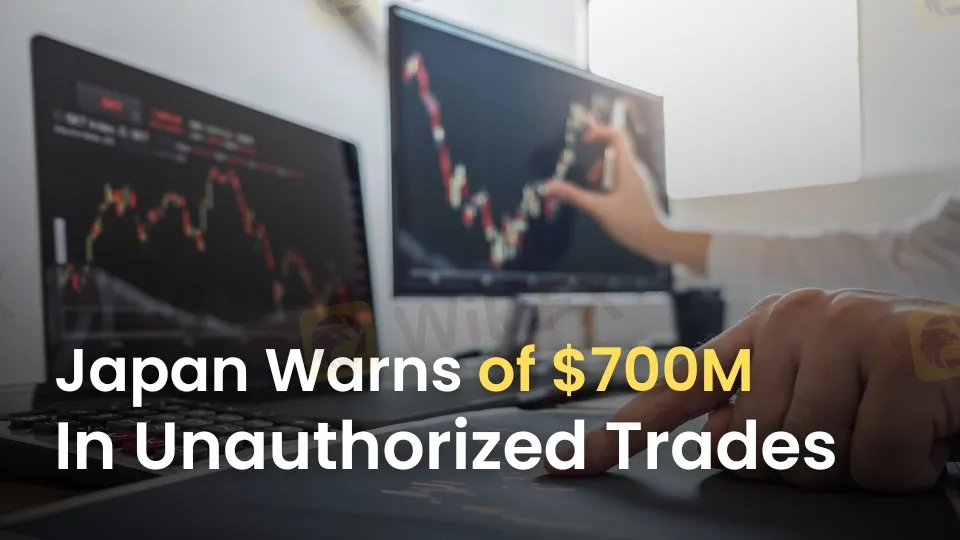简体中文
繁體中文
English
Pусский
日本語
ภาษาไทย
Tiếng Việt
Bahasa Indonesia
Español
हिन्दी
Filippiiniläinen
Français
Deutsch
Português
Türkçe
한국어
العربية
Japan Issues Urgent Warning on $700M Unauthorized Trades
Abstract:Japan's FSA warns of $700M in unauthorized trades from phishing attacks on brokerage accounts. Cybersecurity threats continue to rise in the country.

Japans Financial Services Agency (FSA) recently raised a red flag over a troubling spike in unauthorized trading linked to compromised brokerage accounts. This wave of cybercrime hinges on pilfered customer details snatched largely through deceptive phishing websites that masquerade as trusted securities companies.
The FSA points out that this troubling pattern of unauthorized trading has gained momentum, turning online trading platforms into prime targets for cybercriminals. These attacks often stem from phishing schemes that lure users into surrendering confidential account details. Crafted to mimic authentic brokerage sites, these fraudulent pages dupe people into handing over sensitive information without a second thought.
By April 16, 2025, the FSA had tallied reports from 12 securities firms caught up in this mess. The financial toll? Around $350 million in sales and $315 million in purchases through illicit trades. Hackers typically seize control of accounts, offload stocks, and funnel the profits into Chinese shares, leaving those assets stranded in victims portfolios—a messy aftermath for traders and firms alike.
The stats are grim. More than 3,300 accounts have been breached, with 1,454 shady transactions logged. Big names like Rakuten Securities, Nomura Holdings, SMBC Nikko Securities, and SBI Holdings are among the hardest hit. These companies are teaming up with the FSA to tackle the crisis, and the agency assures that brokerages will foot the bill for their clients losses.

Japan‘s cybersecurity woes aren’t isolated. Last year, at the Munich Cyber Security Conference, an official from the National Center of Incident Readiness and Strategy for Cybersecurity warned that hackers tied to China are zeroing in on vital systems—think telecoms and internet networks. This broader threat looms large over Japans current predicament.
Since early 2025, phishing scams have exploded, especially in Japan. Just in the first 16 days of April, brokerages clocked 736 unauthorized trades—a steep jump from 685 across all of March and a mere 33 in February. The rapid climb signals an intensifying problem, with cybercriminals relentlessly targeting financial institutions.
To fight back, the Japan Securities Dealers Association is pressing firms to beef up defenses. They‘re advocating for tougher account authentication, like multi-factor verification, to lock down customer data and block further breaches. It’s a practical step toward keeping hackers at bay.
Still, the FSA worries that some incidents might remain under the radar. The true scope of this cyber onslaught is still unfolding, and the agency is calling for heightened awareness and teamwork among regulators, brokerages, and everyday traders to blunt its impact.
In short, Japan is wrestling with a sharp uptick in cyber threats, where phishing and hacked trading are shaking up the financial world. The FSA guarantees that firms will cover customer losses, but the pressing need for stronger security can‘t be ignored. With phishing attacks surging, Japan’s financial sector must stay sharp and proactive to weather this storm.

Disclaimer:
The views in this article only represent the author's personal views, and do not constitute investment advice on this platform. This platform does not guarantee the accuracy, completeness and timeliness of the information in the article, and will not be liable for any loss caused by the use of or reliance on the information in the article.
Read more

OctaFX Flagged by Malaysian Authorities
OctaFX has been officially listed on warning lists by both Bank Negara Malaysia (BNM) and the Securities Commission Malaysia (SC). These alerts raise serious concerns about the broker’s status and whether it is legally allowed to operate in Malaysia.

TradingPRO: A Closer Look at Its Licences
In an industry where safety and transparency are essential, the regulatory status of online brokers has never been more important. For traders seeking to protect their capital, ensuring that a platform operates under recognised and stringent oversight can make all the difference. Keep reading to learn more about TradingPRO and its licenses.

Oil Price Breakout Incoming? Investors Should Stay Alert
Oil prices are hovering around a critical level, with potential yet to be fully unleashed. Investors must prepare for sudden changes.

New SEBI Regulations on Intraday Trading
The Securities and Exchange Board of India (SEBI) has implemented revised regulations on Intraday trading, with effect from November 20, 2024. These regulations are meant to lessen risks and prevent speculative trading practices.
WikiFX Broker
Latest News
SkyLine Guide 2025 Malaysia: 100 Esteemed Judges Successfully Assembled
Vantage Markets Review 2025: Trusted Forex and CFD Trading Since 2009
Why STARTRADER Is Popular Among Traders?
A Guide to Intraday Forex Trading You Can't Miss Out
CONSOB Blocks Access to 13 Unauthorized Investment Websites
TradingPRO: A Closer Look at Its Licences
The world could be facing another ‘China shock,’ but it comes with a silver-lining
New SEBI Regulations on Intraday Trading
Everything You need to know about Barath Trade
IronFX Broker Review 2025: A Comprehensive Analysis of Trustworthiness and Performance
Currency Calculator


